- Home
- Elizabeth Gilbert
Big Magic Page 7
Big Magic Read online
Page 7
Consider this very book, for example, which you are right now holding in your hands. Big Magic is obviously a self-help guide, right? But with all due respect and affection, I did not write this book for you; I wrote it for me. I wrote this book for my own pleasure, because I truly enjoy thinking about the subject of creativity. It’s enjoyable and useful for me to meditate on this topic. If what I’ve written here ends up helping you, that’s great, and I will be glad. That would be a wonderful side effect. But at the end of the day, I do what I do because I like doing it.
I have a friend who’s a nun who has spent her entire life working to help the homeless of Philadelphia. She is something close to a living saint. She is a tireless advocate for the poor and the suffering and the lost and the abandoned. And do you know why her charitable outreach is so effective? Because she likes doing it. Because it’s enjoyable for her. Otherwise it wouldn’t work. Otherwise, it would just be hard duty and grim martyrdom. But Sister Mary Scullion is no martyr. She’s a cheerful soul who’s having a wonderful time living out the existence that best suits her nature and most brings her to life. It just so happens that she takes care of a lot of other people in the process—but everyone can sense her genuine enjoyment behind the mission, which is ultimately why her presence is so healing.
It’s okay if your work is fun for you, is what I’m saying. It’s also okay if your work is healing for you, or fascinating for you, or redemptive for you, or if it’s maybe just a hobby that keeps you from going crazy. It’s even okay if your work is totally frivolous. That’s allowed. It’s all allowed.
Your own reasons to create are reason enough. Merely by pursuing what you love, you may inadvertently end up helping us plenty. (“There is no love which does not become help,” taught the theologian Paul Tillich.) Do whatever brings you to life, then. Follow your own fascinations, obsessions, and compulsions. Trust them. Create whatever causes a revolution in your heart.
The rest of it will take care of itself.
Schooling
I never got an advanced degree in writing. I don’t have an advanced degree in anything, actually. I graduated from NYU with a bachelor’s degree in political science (because you have to major in something) and I still feel lucky to have received what I consider to have been an excellent, old-fashioned, broad-minded liberal arts education.
While I always knew that I wanted to be a writer, and while I took a few writing classes as an undergrad, I chose not to seek out a master’s of fine arts in creative writing once I was finished at NYU. I was suspicious of the idea that the best place for me to find my voice would be in a room filled with fifteen other young writers trying to find their voices.
Also, I wasn’t exactly sure what an advanced degree in creative writing would afford me. Going to an arts school is not like going to dentistry school, for instance, where you can be pretty certain of finding a job in your chosen field once your studies are over. And while I do think it’s important for dentists to be officially credentialed by the state (and airline pilots, and lawyers, and manicurists, for that matter), I am not convinced that we need officially credentialed novelists. History seems to agree with me on this point. Twelve North American writers have won the Nobel Prize in Literature since 1901: Not one of them had an MFA. Four of them never even got past high school.
These days, there are plenty of staggeringly expensive schools where you can go to study the arts. Some of them are fabulous; some of them, not so much. If you want to take that path, go for it—but know that it’s an exchange, and make certain that this exchange truly benefits you. What the schools get from the exchange is clear: your money. What the students get out of the exchange depends on their devotion to learning, the seriousness of the program, and the quality of the teachers. To be sure, you can learn discipline in these programs, and style, and perhaps even courage. You may also meet your tribe at art school—those peers who will provide valuable professional connections and support for your ongoing career. You might even be lucky enough to find the mentor of your dreams, in the form of a particularly sensitive and engaged teacher. But I worry that what students of the arts are often seeking in higher education is nothing more than proof of their own legitimacy—proof that they are for real as creative people, because their degree says so.
On one hand, I completely understand this need for validation; it’s an insecure pursuit, to attempt to create. But if you’re working on your craft every day on your own, with steady discipline and love, then you are already for real as a creator, and you don’t need to pay anybody to affirm that for you.
If you’ve already gone out and earned yourself an advanced degree in some creative field or another, no worries! If you’re lucky, it made your art better, and at the very least I’m sure it did you no harm. Take whatever lessons you learned at school and use them to improve your craft. Or if you’re getting a degree in the arts right now, and you can honestly and easily afford to do so, that’s also fine. If your school gave you a free ride, better still. You’re fortunate to be there, so use that good fortune to your advantage. Work hard, make the most of your opportunities, and grow, grow, grow. This can be a beautiful time of focused study and creative expansion. But if you’re considering some sort of advanced schooling in the arts and you’re not rolling in cash, I’m telling you—you can live without it. You can certainly live without the debt, because debt will always be the abattoir of creative dreams.
One of the best painters I know is a teacher at one of the world’s most esteemed art schools—but my friend himself does not have an advanced degree. He is a master, yes, but he learned his mastery on his own. He became a great painter because he worked devilishly hard for years to become a great painter. Now he teaches others, at a level that he himself was never taught. Which kind of makes you question the necessity of the whole system. But students flock from all over the world to study at this school, and many of these students (the ones who are not from wealthy families, or who did not get a full ride of scholarships from the university) come out of that program with tens of thousands of dollars of debt. My friend cares immensely about his students, and so watching them fall so deeply into debt (while, paradoxically, they strive to become more like him) makes this good man feel sick in the heart, and it makes me feel sick in the heart, too.
When I asked my friend why they do it—why these students mortgage their futures so deeply for a few years of creative study—he said, “Well, the truth is, they don’t always think it through. Most artists are impulsive people who don’t plan very far ahead. Artists, by nature, are gamblers. Gambling is a dangerous habit. But whenever you make art, you’re always gambling. You’re rolling the dice on the slim odds that your investment of time, energy, and resources now might pay off later in a big way—that somebody might buy your work, and that you might become successful. Many of my students are gambling that their expensive education will be worth it in the long run.”
I get this. I’ve always been creatively impulsive, too. It comes with the territory of curiosity and passion. I take leaps and gambles with my work all the time—or at least I try to. You must be willing to take risks if you want to live a creative existence. But if you’re going to gamble, know that you are gambling. Never roll the dice without being aware that you are holding a pair of dice in your hands. And make certain that you can actually cover your bets (both emotionally and financially).
My fear is that many people pay through the nose for advanced schooling in the arts without realizing that they’re actually gambling, because—on the surface—it can look like they’re making a sound investment in their future. After all, isn’t school where people go to learn a profession—and isn’t a profession a responsible and respectable thing to acquire? But the arts are not a profession, in the manner of regular professions. There is no job security in creativity, and there never will be.
Going into massive debt in order to become a creator, then, can make a stress and a
burden out of something that should only ever have been a joy and a release. And after having invested so much in their education, artists who don’t immediately find professional success (which is most artists) can feel like failures. Their sense of having failed can interfere with their creative self-confidence—and maybe even stop them from creating at all. Then they’re in the terrible position of having to deal not only with a sense of shame and failure, but also with steep monthly bills that will forever remind them of their shame and failure.
Please understand that I am not against higher education by any means; I am merely against crippling indebtedness—particularly for those who wish to live a creative life. And recently (at least here in America) the concept of higher education has become virtually synonymous with crippling indebtedness. Nobody needs debt less than an artist. So try not to fall into that trap. And if you have already fallen into that trap, try to claw your way out of it by any means necessary, as soon as you can. Free yourself so that you can live and create more freely, as you were designed by nature to do.
Be careful with yourself, is what I’m saying.
Be careful about safeguarding your future—but also about safeguarding your sanity.
Try This Instead
Instead of taking out loans to go to a school for the arts, maybe try to push yourself deeper into the world, to explore more bravely. Or go more deeply and bravely inward. Take an honest inventory of the education you already have—the years you have lived, the trials you have endured, the skills you have learned along the way.
If you are a young person, open your eyes wide and let the world educate you to the fullest extent. (“Ascend no longer from the textbook!” warned Walt Whitman, and I warn it, too; there are many ways to learn that do not necessarily involve schoolrooms.) And feel free to start sharing your perspective through creativity, even if you’re just a kid. If you are young, you see things differently than I do, and I want to know how you see things. We all want to know. When we look at your work (whatever your work may be), we will want to feel your youth—that fresh sense of your recent arrival here. Be generous with us and let us feel it. After all, for many of us it has been so long since we stood where you now stand.
If you are older, trust that the world has been educating you all along. You already know so much more than you think you know. You are not finished; you are merely ready. After a certain age, no matter how you’ve been spending your time, you have very likely earned a doctorate in living. If you’re still here—if you have survived this long—it is because you know things. We need you to reveal to us what you know, what you have learned, what you have seen and felt. If you are older, chances are strong that you may already possess absolutely everything you need to possess in order to live a more creative life—except the confidence to actually do your work. But we need you to do your work.
Whether you are young or old, we need your work in order to enrich and inform our own lives.
So take your insecurities and your fears and hold them upside down by their ankles and shake yourself free of all your cumbersome ideas about what you require (and how much you need to pay) in order to become creatively legitimate. Because I’m telling you that you are already creatively legitimate, by nature of your mere existence here among us.
Your Teachers
Do you want to study under the great teachers? Is that it?
Well, you can find them anywhere. They live on the shelves of your library; they live on the walls of museums; they live in recordings made decades ago. Your teachers don’t even need to be alive to educate you masterfully. No living writer has ever taught me more about plotting and characterization than Charles Dickens has taught me—and needless to say, I never met with him during office hours to discuss it. All I had to do in order to learn from Dickens was to spend years privately studying his novels like they were holy scripture, and then to practice like the devil on my own.
Aspiring writers are lucky in a way, because writing is such a private (and cheap) affair and always has been. With other creative pursuits, admittedly it’s trickier and can be far more costly. Strict, supervised training can be essential if you want to be, for instance, a professional opera singer, or a classical cellist. For centuries, people have studied at music conservatories, or dance or art academies. Many marvelous creators have emerged from such schools over time. Then again, many other marvelous creators did not. And many talented people acquired all that magnificent education, but never put it into practice.
Most of all, there is this truth: No matter how great your teachers may be, and no matter how esteemed your academy’s reputation, eventually you will have to do the work by yourself. Eventually, the teachers won’t be there anymore. The walls of the school will fall away, and you’ll be on your own. The hours that you will then put into practice, study, auditions, and creation will be entirely up to you.
The sooner and more passionately you get married to this idea—that it is ultimately entirely up to you—the better off you’ll be.
The Fat Kids
Here’s what I did during my twenties, rather than going to school for writing: I got a job as a waitress at a diner.
Later, I became a bartender, as well. I’ve also worked as an au pair, a private tutor, a ranch hand, a cook, a teacher, a flea-marketeer, and a bookstore clerk. I lived in cheap apartments, had no car, and wore thrift-shop clothes. I would work every shift, save all my money, and then go off traveling for a while to learn things. I wanted to meet people, and to hear their stories. Writers are told to write what they know, and all I knew was that I didn’t know very much yet, so I went forth in deliberate search of material. Working at the diner was great, because I had access to dozens of different voices a day. I kept two notebooks in my back pockets—one for my customers’ orders, and the other for my customers’ dialogue. Working at the bar was even better, because those characters were often tipsy and thus were even more forthcoming with their narratives. (As a bartender, I learned that not only does everybody have a story that would stop your heart, but everybody wants to tell you about it.)
I sent my work out to publications, and I collected rejection letters in return. I kept up with my writing, despite the rejections. I labored over my short stories alone in my bedroom—and also in train stations, in stairwells, in libraries, in public parks, and in the apartments of various friends, boyfriends, and relatives. I sent more and more work out. I was rejected, rejected, rejected, rejected.
I disliked the rejection letters. Who wouldn’t? But I took the long view: My intention was to spend my entire life in communion with writing, period. (And people in my family live forever—I have a grandmother who’s one hundred and two!—so I figured my twenties was too soon to start panicking about time running out.) That being the case, editors could reject me all they wanted; I wasn’t going anywhere. Whenever I got those rejection letters, then, I would permit my ego to say aloud to whoever had signed it: “You think you can scare me off? I’ve got another eighty years to wear you down! There are people who haven’t even been born yet who are gonna reject me someday—that’s how long I plan to stick around.”
Then I would put the letter away and get back to work.
I decided to play the game of rejection letters as if it were a great cosmic tennis match: Somebody would send me a rejection, and I would knock it right back over the net, sending out another query that same afternoon. My policy was: You hit it to me, I’m going to hit it straight back out into the universe.
I had to do it this way, I knew, because nobody was going to put my work out there for me. I had no advocate, no agent, no patron, no connections. (Not only did I not know anyone who had a job in the publishing world, I barely knew anyone who had a job.) I knew that nobody was ever going to knock on my apartment door and say, “We understand that a very talented unpublished young writer lives here, and we would like to help her advance her career.” No, I would have to announce my
self, and so I did announce myself. Repeatedly. I remember having the distinct sense that I might never wear them down—those faceless, nameless guardians of the gate that I was tirelessly besieging. They might never give in to me. They might never let me in. It might never work.
It didn’t matter.
No way was I going to give up on my work simply because it wasn’t “working.” That wasn’t the point of it. The rewards could not come from the external results—I knew that. The rewards had to come from the joy of puzzling out the work itself, and from the private awareness I held that I had chosen a devotional path and I was being true to it. If someday I got lucky enough to be paid for my work, that would be great, but in the meantime, money could always come from other places. There are so many ways in this world to make a good enough living, and I tried lots of them, and I always got by well enough.
I was happy. I was a total nobody, and I was happy.
I saved my earnings and went on trips and took notes. I went to the pyramids of Mexico and took notes. I went on bus rides through the suburbs of New Jersey and took notes. I went to Eastern Europe and took notes. I went to parties and took notes. I went to Wyoming and worked as a trail cook on a ranch and took notes.
At some point in my twenties, I gathered together a few friends who also wanted to be writers, and we started our own workshop. We met twice a month for several years and we read one another’s work loyally. For reasons that are lost to history, we named ourselves the Fat Kids. It was the world’s most perfect literary workshop—or at least it was in our eyes. We had selected one another carefully, thereby precluding the killjoys and bullies who show up in many workshops to stomp on people’s dreams. We held each other to deadlines and encouraged each other to submit our work to publishers. We came to know each other’s voices and hang-ups, and we helped each other to work through our specific habitual obstacles. We ate pizza and we laughed.

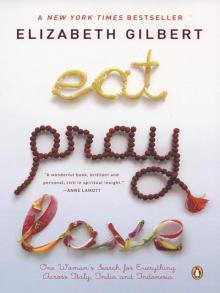 Eat, Pray, Love
Eat, Pray, Love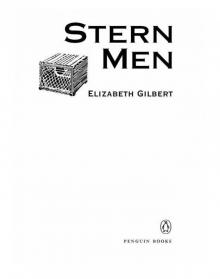 Stern Men
Stern Men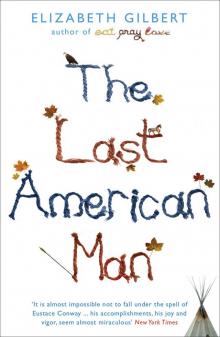 The Last American Man
The Last American Man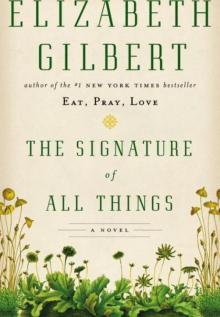 The Signature of All Things
The Signature of All Things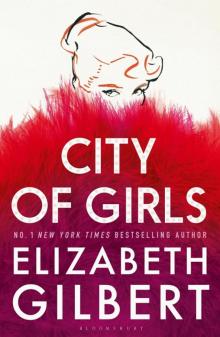 City of Girls
City of Girls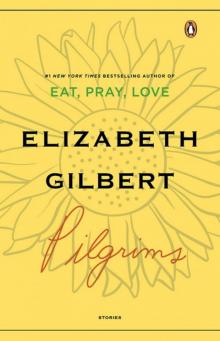 Pilgrims
Pilgrims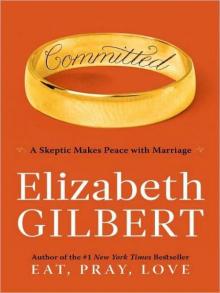 Committed: A Skeptic Makes Peace With Marriage
Committed: A Skeptic Makes Peace With Marriage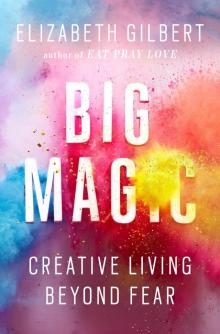 Big Magic
Big Magic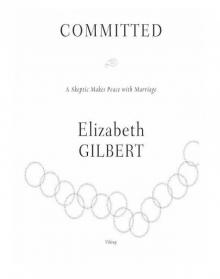 Committed
Committed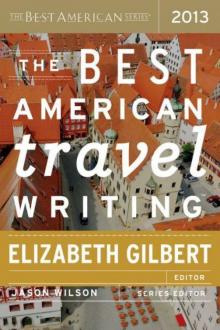 The Best American Travel Writing 2013
The Best American Travel Writing 2013